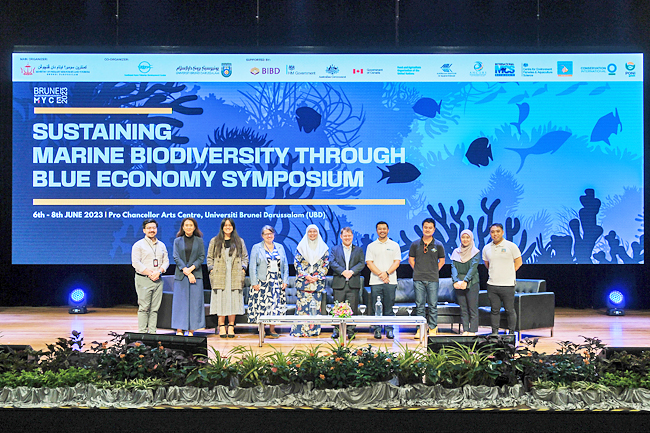Youth involvement in volunteerism and efforts towards promoting the blue economy and ocean management is crucial in building a sustainable future.
Youth represents the future generation and will inherit the consequences of the environmental and social challenges that are happening at present. Hence, by engaging in volunteerism and sustainability efforts, they can contribute to shaping a better future for themselves and subsequent generations.
This was highlighted by panel speakers at a recent forum organised by Bank Islam Brunei Darussalam (BIBD) as part of the ‘Sustaining Marine Biodiversity Through Blue Economy Symposium 2023’ organised from June 6-8 by the Fisheries Department in conjunction with World Ocean Day.
The Young Environmental Leaders Forum was participated by High Commissioner of Australia to Brunei Darussalam Luke Arnold, Chief Executive Officer of Poni Divers Foundation Mohd Tahsin Wong Abdullah, President and Founder of Beach Bunch Rizan Latif, Executive member of BruWILD Noorlela binti Yassin, Founder of Future Ocean Borneo PLT and Green Environment Ambassador of Miri City Iqbal Abdullah, and Reef Check’s Secretariat and Project Manager for coral restoration Frederick Chong.
The speakers highlighted that anyone, especially the youth, can help to create a more sustainable blue economy by being involved and taking action – from volunteering, engaging the policymakers and communities, buying environmentally-friendly goods, and reducing plastic consumption.

The speakers emphasised that education and awareness are critical and volunteering could be a key to achieving this as those involved will learn and witness first-hand the state of the environment.
“The main mission of the Sustainable Development Goals (SDGs) by the United Nations (UN) was not to leave anyone behind and this also involves the needs and interests of youth everywhere in the world.
“Youth are more inclined to adopt new technologies and techniques; thus, they could catalyse sustainable development, especially in seeking to maximise economies and social benefits while minimising environmental degradation from any industrial sector,” said Iqbal.
He added that youth must be seen more than just as participants and collaborators but also as strategic partners.
“Marine education is part of conservation and being a strategic partner to any other society or voluntary works in marine conservation, they could prove to be a valuable help to nurture other young people with skills, tools and necessary perspective,” said Iqbal.
He highlighted that as youth represents the future of a country, it is vital for Brunei to engage its youth in activities related to promoting the blue economy and marine resources management.
“They are the ones that would lead the Sultanate’s economy for they are also their own ambassador. Young people lead young people. Young people are indeed our largest untapped resources for advancing the local and global marine agenda,” he said.
“The youth are more absorbed in new knowledge and technology and make up the majority of users on social media platforms. Youth has already come up with many creative solutions to the world’s greatest challenge.
“Some of the youth have even started social enterprises just like us, the Future Ocean Borneo LLP (an accredited Social Enterprise in Malaysia), in increasing connections between youth and relevant stakeholders,” Iqbal added.
Meanwhile, Frederick Chong said, “Our youth is a great trendsetter in this era. Let the youth be involved in programmes that provide learning platforms but also allow them to work within their strength. For example, a one-day programme that lets them experience being a fisherman or participate in coral restoration activities will allow them to understand better how the blue economy helps and benefits the nation.”
He added that youth should view non-governmental organisations (NGOs) as mentors who can give youth roles and responsibilities to build their leadership, operational and social skills.
“Once the youth discover their interests towards a cause, they will want to learn more. NGOs can provide the platforms and roles like a spokesperson, surveyor, data analyst, social media or team leader. All these roles will not only help the blue economy and preserve the goal of these NGOs towards ocean management but also build and develop quality youth characters,” Chong said.
He further said that the future of every nation relies heavily on each generation of youth.
“We always need someone to learn and be the next leader to spearhead the nation’s economic development and growth, including in ocean management which is often overlooked… the involvement of youth in sustainable development initiatives will re-engineer their mindset towards sustainable approaches.”
Striking a balance between developing and growing the economy through marine resources and maintaining a healthy environment is crucial. This requires the government, corporate organisations, NGOs, social enterprises and the public to work hand in hand to achieve the goal.
BIBD recently announced the launch of the BIBD Sustainability Leaders Awards to recognise and celebrate the efforts of youth in Brunei towards building a more sustainable future.
As the first of its kind in the country, the BIBD Sustainability Awards seeks to empower and inspire the next generation to take bold steps towards addressing environmental, social and economic challenges, forging a path towards a more sustainable and resilient society.
BIBD expresses its belief in nurturing and empowering the next generation as the Group understands the critical role that youth can play in shaping the future, especially towards advancing the progress of our Brunei Vision 2035 and the UN SDGs.
The implementation of this award is part of BIBD’s commitment of BND2 billion towards sustainability funding under the BIBD Sustainability Framework and continued efforts towards achieving the UN SDGs.






